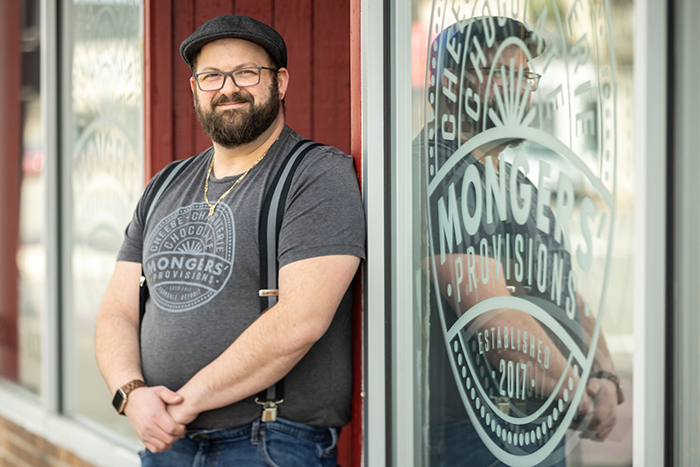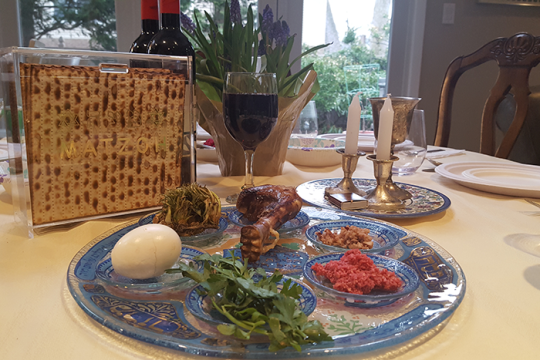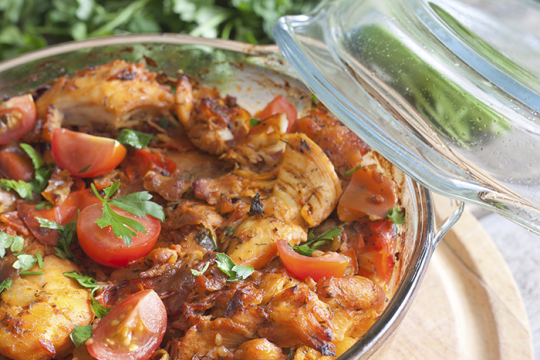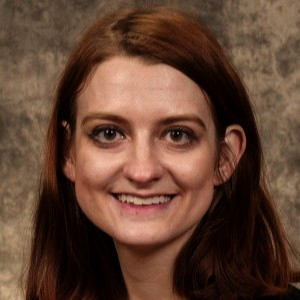
Zach Berg got his start in the food industry at 12 years old, when he helped cater the Maccabiah Games in his hometown of Detroit, Michigan. By 17, he was catering solo events and cooking his way through high school. After graduation, Berg worked at the famous Zingerman's Delicatessen in Ann Arbor, MI, then became a chef on the West Coast before founding Mongers' Provisions in Detroit in 2017. Berg's philosophy about food is simple: it's a way to connect people locally and globally. We sat down with Berg to talk about his passion for building bridges with an unlikely ingredient: cheese.
URJ: Your primary product is cheese. What prompted you to specifically focus on that?
Berg: I actually happened to meet up with [my friend] Ari from Zingerman's when he was on the West Coast giving a book talk in 2012. He looked at me and said, "You look terrible. Why don't you go back to selling cheese? You're a happy cheesemonger." I listened to him and have been consistently doing cheese since.
In my mind, cheese is not a condiment; it's geography, it's history, it's evolution, and it's culture. I think food has a lot to say about those things in a very small package.
What makes you "a happy cheesemonger?"
I see my role as being both a grocer and storyteller. My job is to tell the story of the people who make your food because they're too busy making your food to tell their story themselves. Our mission for this store was to cultivate a community and connect people with passion, both our passion and the passion of producers.
As a storyteller, while I could tell the story of Parmigiano Reggiano, I'm much more interested in telling a story about Andy Hatch from Dodgeville, Wisconsin. I've sat at his dinner table enough times that it means so much more to increase that line item on our balance sheet. So yeah, we want to buy as local as we can.
When was a time you were able to help a customer connect with a producer?
We sell a really beautiful chocolate from a company named Marou in southern Vietnam. They source all their chocolate from the bottom third of the country that allows for chocolate cultivation. On our first weekend, a Vietnam veteran was eating our chocolate and Will, my business partner, was telling him its story. We had a standing map of Vietnam with the regions the chocolate was from, and the guy remarked, "I've never looked at this map as anything other than strategic." To look at this map and eat this chocolate, for him, was a transformative moment. He bought four bars and sent it to all the people he kept in touch with from his platoon.
That's beautiful. Speaking of connection, you also hold cheese tastings over Zoom. How did that come about?
In the early months of quarantine during COVID, a Jewish organization came to us and was like, "Hey, people are suffering, we need to connect." They asked, "Is there a way for us to do a Zoom tasting if we get you addresses in the general area?"
Running deliveries was perfect for us, so we dropped off [about] 30 cheese boxes in a 10-mile radius and met everybody on Zoom. That night, my phone was blowing up with messages like "Thank you, this was so nice," and "This was a breath of fresh air."
We held something like 180-200 tastings that first year on Zoom, and I had four or five people around the country who were also facilitating these tastings. During the pandemic, we made over a half a million dollars through our virtual tastings. It literally saved our business.
How does selling cheese help you connect with your Jewish identity?
To me, it's all about drawing a connection between modern Jews and our history. We were all herders and farmers at some point. It's very clear that our liturgy was written for an agrarian society. So, I use the opportunities that holidays present to connect with that part of our history. Cheese ends up being a modality for that.
How have Jewish values influenced how you do business?
I work to cultivate community, so it's all about building relationships. I use food as a way to help bridge divides. I'm a Jewish shop owner, but some people might be surprised that we carry two Palestinian brands and that I think it's important to celebrate Palestinian-grown goods.
It's been hard to have nuanced conversations around the war in Gaza, obviously. Everybody's seen that. But to me, it goes back to the core principle of connecting with people. I don't see anybody in Gaza as anything other than people who have every right to feed their families and celebrate their food traditions.
My business is near one of the largest Arab populations in the United States; I'm also in a place that has a large Jewish population. I hope to feed both communities at all times with love and understanding.
To start dialogues across lines of difference in your own community, check out the URJ's Talk for a Change curriculum.
Related Posts

Judaism: The Faith of Feasting

Prepping for Passover: A Resource Roundup for a Satisfying Seder


